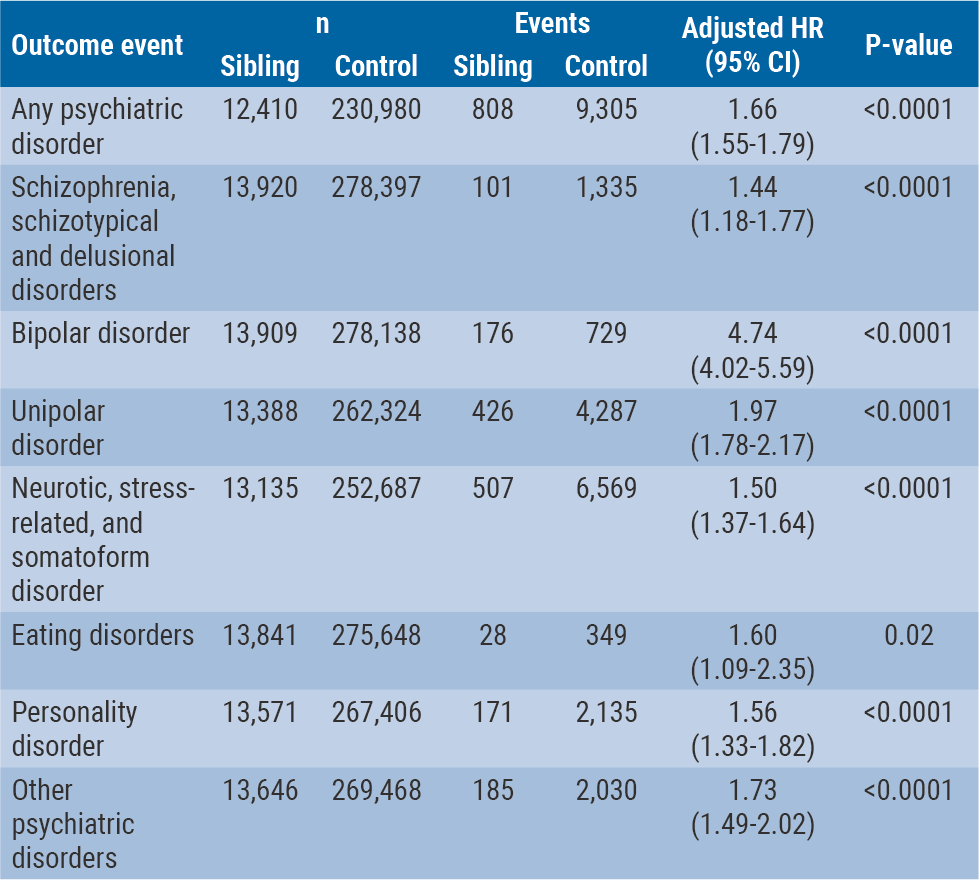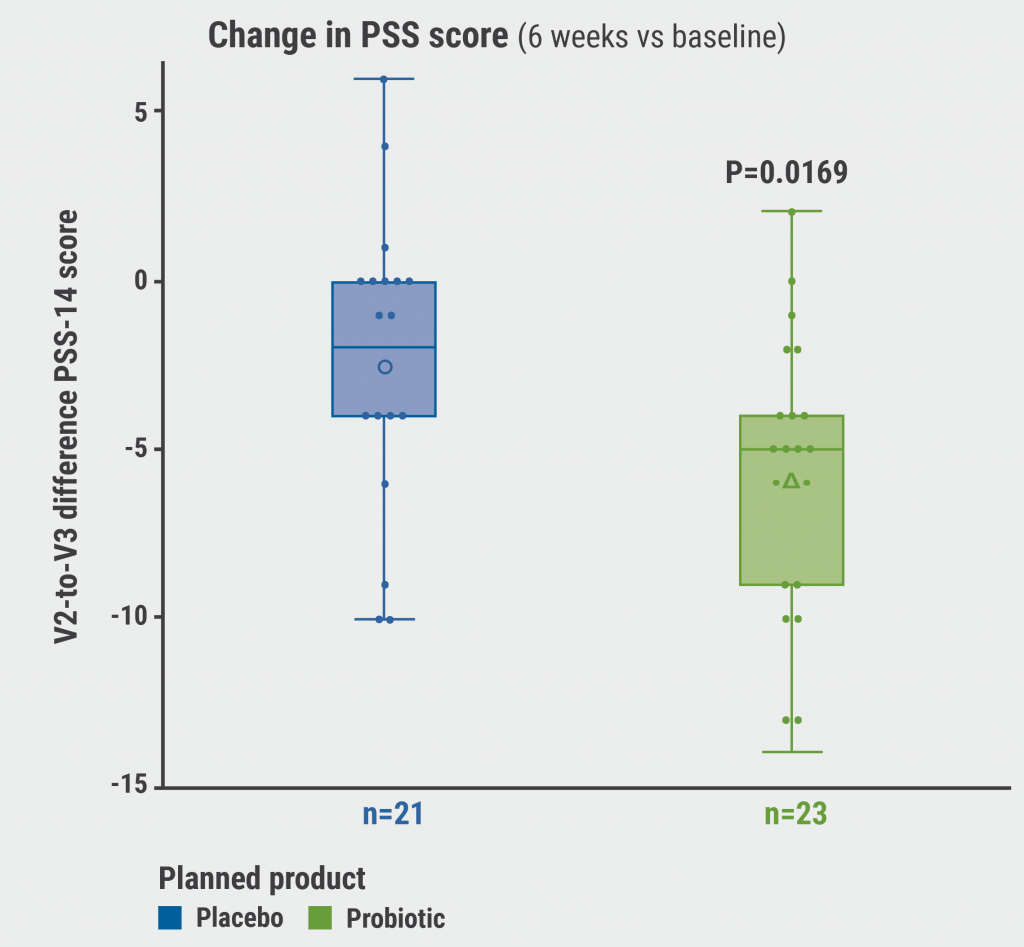The risk of developing any psychiatric disorder for siblings of patients with bipolar disorder is increased during a lifetime. Moreover, recurrence after a single bipolar episode is seen in 40-60% of patients. To prevent a relapse of bipolar disorder, strategies may include treatment in a specialised mood disorder clinic with age-specific strategies.
Prof. Lars Vedel Kessing (Copenhagen Affective Disorder Research Center, Denmark) introduced a cohort of 19,955 patients with a main diagnosis of bipolar disorder (derived from the Danish Psychiatric Central Research Register from 1995-2017) [1]. The study presented here included 13,923 siblings to the 19,955 patients with bipolar disorder and 278,460 controls from the general population, matched for year of birth and sex.
The study found that the risk of developing any psychiatric disorder for siblings of patients with bipolar disorder was increased during a lifetime, mainly for bipolar disorder (HR 4.74) but also all other disorders. Results were adjusted for sex, calendar period, and employment status (see Table).
Table: Hazard ratio of psychiatric disorders for siblings of patients with bipolar disorder versus controls [1]

When it comes to preventing the first relapse of bipolar disorder, a meta-analysis showed that between 40-60% of patients (adults, children, and adolescents) have a recurrence following a single manic or mixed episode [2]. Thus, early intervention to stop clinical progression seems appropriate, although not much data is available on this.
A previous study by Prof. Kessing and colleagues showed that treatment in a specialised mood disorder clinic early in the course of bipolar disorder substantially reduced re-admission to a psychiatric hospital and increased satisfaction with care [3]. The rate of hospital re-admission was significantly decreased for patients treated in the mood disorder clinic compared with standard treatment (unadjusted HR 0.60; 95% CI 0.37-0.97; P=0.034), with the effect being even higher in younger people aged 18-25 years.
Prof. Kessing concluded that strategies to prevent the onset of psychiatric illness in individuals with a first-generation family history of bipolar disorder should not be limited to adolescence and early adulthood but should cover a lifetime, likely with age-specific strategies. To prevent a (first) relapse of bipolar disorder, strategies may include treatment in a specialised mood disorder clinic. This also saves total net costs, the total sum being 11% of the costs for standard care [1,3].
- Kessing LV. Strategies to prevent the onset and first relapse of bipolar disorders. S.25.02. ECNP Congress 2020.
- Kessing LV, et al. Bipolar Disorders. 2018;20(1):9-17.
- Kessing LV, et al. Br J Psychiatry. 2013 Mar;202(3):212-9.
Posted on
Previous Article
« Seasonal pattern and bipolar disorder Next Article
Social media and bipolar disorder: a risky combination »
« Seasonal pattern and bipolar disorder Next Article
Social media and bipolar disorder: a risky combination »
Table of Contents: ECNP 2020
Featured articles
Psychosis and Schizophrenia
Prognostic tools in the management of clinical high risk for psychosis
Reduced auditory cortex activation during speech perception in patients with schizophrenia
Dementia
Predicting MCI and dementia by assessing worrying about memory
Genomics of vascular dementia and stroke
Bipolar Disorders
Social media and bipolar disorder: a risky combination
How to prevent the onset and first relapse of bipolar disorders?
Seasonal pattern and bipolar disorder
OCD and Depression
Personalised medicine in depression: a realistic way forward?
Heart rate could be a potential biomarker for depression
Listening to Mozart has a beneficial effect on epilepsy
Mental Health
Mental health during the COVID-19 pandemic
Microdosing psychedelics offers perspective but needs further evaluation
The PRISM project: focusing on biological parameters across neuropsychiatric disorders
Smartphone can support personalised medicine in psychiatry
Baby’s heart rate shows stress if their mother is depressed or anxious
Autism and ADHD
Movement computing promising in analysing motor impairment in children with autism spectrum disorder
Screening with ADHD Self-Report accurate in girls
No altered fractional anisotropy in ADHD
Role of the Microbiome
Micronutrient supplementation as treatment for psychiatric symptoms
Substance Abuse
Altered gene expression of endogenous opioid system after alcohol exposure in adolescent rodents
Subgroups in alcohol use disorder based on externalising symptoms
New drugs for alcohol use disorder to focus on combination therapy
Related Articles
March 16, 2021
ACE inhibitors tied to schizophrenia risk

November 28, 2022
Probiotics could reduce perceived stress
© 2024 Medicom Medical Publishers. All rights reserved. Terms and Conditions | Privacy Policy
HEAD OFFICE
Laarderhoogtweg 25
1101 EB Amsterdam
The Netherlands
T: +31 85 4012 560
E: publishers@medicom-publishers.com

